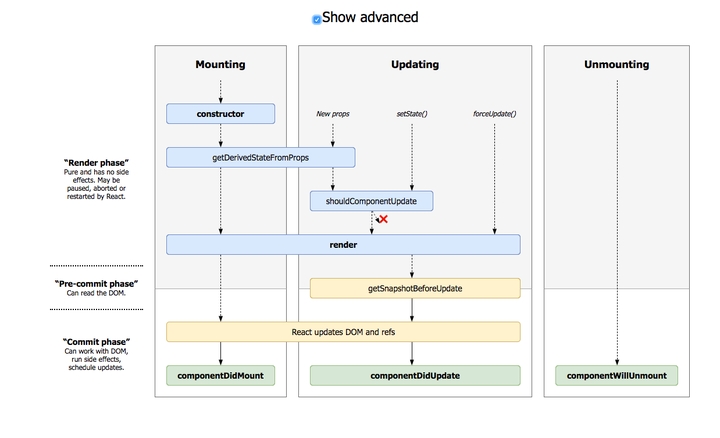React 组件的生命周期
每一个 React 组件的实例都拥有着一套完善的生命周期,主要分为挂载、更新和卸载三个大阶段,每一个阶段都拥有着更为细化的生命周期。
三个阶段与相关 API

挂载
挂载阶段相关的生命周期 API:
static getDefaultPropsinitialize stateconstructor(props)static getDerivedStateFromProps(nextProps, prevState)(V 16.3.0)componentWillMount()/UNSAFE_componentWillMount()render()componentDidMount()
更新
更新阶段相关的生命周期 API:
componentWillReceiveProps(nextProps)/UNSAFE_componentWillreceiveProps(nextProps)static getDerivedStateFromProps(nextProps, prevState)(V 16.3.0)shouldComponentUpdate(nextProps, nextState)componentWillUpdate(nextProps, nextState)/UNSAFE_componentWillUpdate(nextProps, nextState)render()getSnapshotBeforeUpdate(prevProps, prevState)(V 16.3.0)componentDidUpdate(prevProps, prevState, snapshot)
卸载
卸载阶段相关的生命周期 API:
componentWillUnmount()
API 详情
static getDefaultProps
定义默认属性
initialize state
初始化 state。
当前版本的官方文档(V 16.3.0)未说明该阶段。在 React V 16.0.0 之前,React.createClass 仍未废弃的情况下,还包含着这个阶段相关的 api。当前的官方文档中的示例,初始化
state都是在constructor中完成。但是文档中说到_(The constructor is the right place to initialize state. _To do so, just assign an object to _this.state),_猜测实际上仍存在该阶段
constructor(props)
构造器函数,在此阶段进行初始化 state 和事件处理器(event handler)的上下文绑定
React.Component的子类的构造器函数里,一定得调用super(props),否则this.props将会是undefined不要在这个阶段调用this.setState(),倘若要改变 state,只需要 state 对象进行 assign 操作即可
如果,不需要初始化 state 也不打算给 class 实例绑定,事件处理器,就没有必要实现
conostructor在此阶段改变 state 时,不处理受到 props 影响的值,而是在
componentWillMount或getDerivedStateFrom内处理
static getDerivedStateFromProps(nextProps, prevState)
React v16.3.0新增 API。getDerivedStateFromProps()在组件初始化和接收新的 props 时调用。将会返回一个 object 去更新 state,或是返回一个null表示新的 props 不会导致 state 更新。
无论 props 是否改变,该函数都会被调用
通常情况下,
this.setState()不会触发该函数一旦使用了这个新的生命周期函数,不安全的生命周期函数将不会被调用
UNSAFE_componentWillMount()
componentWillMount() 的别名。在即将挂载的时候调用。由于该阶段在render之前,因此,在该阶段异步的调用setState()不会触发额外的渲染。在挂载之前,最后一次允许改变 state 的阶段。
componentWillMount这个名称计划在 React V17.0.0 之后废弃掉。react 提供了 rename-unsafe-lifecycles codemod 这个工具去自动更新该生命周期函数会受到
static getDerivedStateFromProps()和getSnapshotBeforeUpdate()的影响而无法使用
componentDidMount()
componentDidMount()在挂载完成后调用。在该阶段可进行加载远程数据,订阅事件,设置定时器等操作。
该阶段调用 setState() 会触发额外的渲染,处理不当可能会导致死循环
UNSAFE_componentWillReceiveProps(nextProps)
componentWillReceiveProps()的新名称,在一个已经挂载的组件接收到新 props 时被调用。如果需要在此阶段根据 props 更新 state,最后先比较 this.props和nextProps后再调用setState()
如果是父组件导致重新渲染,即使 props 没变更也会被调用
componentWillReceiveProps计划在 React V17.0.0 之后废弃掉该生命周期函数会受到
static getDerivedStateFromProps()和getSnapshotBeforeUpdate()的影响而无法使用
shouldComponentUpdate(nextProps, nextState)
shouldComponentUpdate()在一个已经挂载的组件接收到新的 props 或 state 时被调用,其返回一个布尔值告诉 React 是否应该进行更新。默认情况下,每一次的状态变更都会进行重新渲染。
当shouldComponentUpdate()的返回false时,UNSAFE_componentWillUpdate(),render()和componentDidUpdate()都不会被调用。
对于React.PureComponent的子类,shouldComponentUpdate()对 props 和 state 进行了一次浅比较。
如果,
React.PureComponent的子类重写了shouldComponentUpdate()React 在开发环境下会有以下警告:Warning: XXXX has a method called shouldComponentUpdate(). shouldComponentUpdate should not be used when extending React.PureComponent. Please extend React.Component if shouldComponentUpdate is used.
UNSAFE_componentWillUpdate(nextProps, nextState)
componentWillUpdate()的新名称,在一个已经挂载的组件接收到新的 props 或 state,并且shouldComponentUpdate()返回true时被调用。这是在更新之前最后一次准备的机会。
不要在这个阶段调用
this.setState(),dispatch Redux 的 action 也一样,否则,可能会导致 React 组件在UNSAFE_componentWillUpdate()返回前就进行了一次更新。
componentWillUpdate计划在 React V17.0.0 之后废弃掉该生命周期函数会受到
static getDerivedStateFromProps()和getSnapshotBeforeUpdate()的影响而无法使用
getSnapshotBeforeUpdate(prevProps, prevState)
React V16.3.0 新增的生命周期。在当前已挂载的组件调用 render() 之后调用。该函数的返回值将作为componentDidMount()的第三个参数传递下去。
一旦使用了这个新的生命周期函数,不安全的生命周期函数将不会被调用
componentDidUpdate(prevProps, prevState, snapshot)
componentDidUpdate()在更新结束后立刻被调用,可以在这个阶段进行 DOM 的操作、网络请求等。
componentWillUnmount()
当一个组件即将被卸载和销毁时会立刻调用componentWillUnmount()函数,在这个阶段可以进行取消网络、清空订阅等操作。
最后更新于